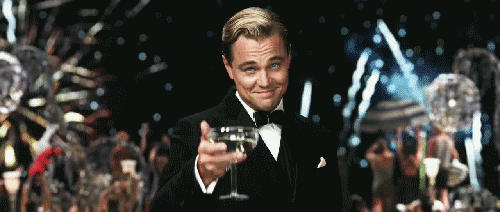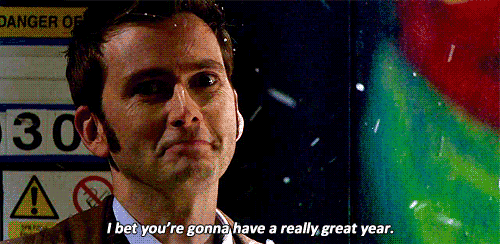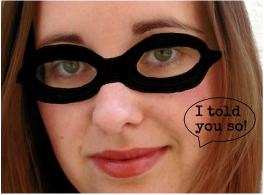Holly Walrath's Blog, page 34
April 6, 2017
NAPOWRIMO Day 6
 Today's poem is a dark one about fairies. I'm not sure if it's a poem or a story or a long narrative poem. Only time will tell.
Today's poem is a dark one about fairies. I'm not sure if it's a poem or a story or a long narrative poem. Only time will tell.
Published on April 06, 2017 06:23
April 5, 2017
NaPoWriMo Day 5
 Day 5! You beautiful day of poems. At first I was struggling with where to go so I just started writing about my morning. Before long I had 3 poems done. This is what I love about NAPOWRIMO, when you start to get a rhythm. The more poems you write, the more poems you write. It's important to remember that.
Day 5! You beautiful day of poems. At first I was struggling with where to go so I just started writing about my morning. Before long I had 3 poems done. This is what I love about NAPOWRIMO, when you start to get a rhythm. The more poems you write, the more poems you write. It's important to remember that.
Published on April 05, 2017 06:03
April 4, 2017
NAPOWRIMO Day 4
 This is just part of a plain old poem. Also wrote a haiku so I guess that's two for today! I'm refraining from posting the haiku though as I want to eventually publish these.
This is just part of a plain old poem. Also wrote a haiku so I guess that's two for today! I'm refraining from posting the haiku though as I want to eventually publish these.
Published on April 04, 2017 05:58
April 3, 2017
NAPOWRIMO Day 3
 For today's poem I'm playing around with index cards to create a shuffle poem. It may turn out to be a prose piece, I'm not sure yet. The prompt for this one was "The General Store".
For today's poem I'm playing around with index cards to create a shuffle poem. It may turn out to be a prose piece, I'm not sure yet. The prompt for this one was "The General Store".
Published on April 03, 2017 07:32
April 2, 2017
NAPOWRIMO Day 2
 Today my poem is based on a book of Japanese fairy tales I'm rereading. There's a very sad one about a man who falls in love with a turtle princess and when he leaves her to go see his family he finds that 300 years have passed. I wanted to reimagine the story so that he could live and die in peace. This stanza is a start. It's also heavily influenced by Hemingway's "Old Man and the Sea". I may weave some found poetry from the texts into this one.
Today my poem is based on a book of Japanese fairy tales I'm rereading. There's a very sad one about a man who falls in love with a turtle princess and when he leaves her to go see his family he finds that 300 years have passed. I wanted to reimagine the story so that he could live and die in peace. This stanza is a start. It's also heavily influenced by Hemingway's "Old Man and the Sea". I may weave some found poetry from the texts into this one.
Published on April 02, 2017 08:29
April 1, 2017
NAPOWRIMO Day 1

Today I wrote the start of a poem about Pluto. It's a found-text poem, where I mix facts about Pluto with the story of a woman in a complex relationship.
Day one of #NaPoWriMo DONE
Published on April 01, 2017 08:57
January 1, 2017
My New years writing resolutions
 As 2016 draws to a close, I think many in the writing community are thinking the same thing as me: good riddance. It’s been a rough year among my writing friends, but there have also been triumphs. People I love were in turmoil, and others celebrated life-goals met. The bitter mingled with the sweet. Personal troubles were briefly outweighed by writing milestones. Even now, I’m clinging to the holidays like I haven’t in the past, letting myself enjoy them for the simple love of candy canes and sugar cookies. I feel a sense that things in 2017 may change, but I can’t tell where they are going. All I know is that I want so badly to recenter, refocus, recharge. As the New Year approaches, here are a few of the things I’m resolving to do with my writing.
As 2016 draws to a close, I think many in the writing community are thinking the same thing as me: good riddance. It’s been a rough year among my writing friends, but there have also been triumphs. People I love were in turmoil, and others celebrated life-goals met. The bitter mingled with the sweet. Personal troubles were briefly outweighed by writing milestones. Even now, I’m clinging to the holidays like I haven’t in the past, letting myself enjoy them for the simple love of candy canes and sugar cookies. I feel a sense that things in 2017 may change, but I can’t tell where they are going. All I know is that I want so badly to recenter, refocus, recharge. As the New Year approaches, here are a few of the things I’m resolving to do with my writing. 1. WRITE MORE In 2016 I wrote over 120 poems and roughly twenty or so short stories. I have been told by fellow writers that this is a large output. Yet Some thing in me continues to insist it is not enough. Perhaps this is because these works were squeezed out in early mornings and late nights, rarely at my desk in the comfort and solitude of my home office. When I look back on this year’s writing accomplishments, they still feel metered, as if I’ve stolen them from the ether. The appropriate goal may instead be, “Revise more” or “Make more space to write”. At any rate, my hope is to approach writing with even more seriousness in the New Year. 2. Write for Myself More It’s rare that I find myself writing to a trend, so this goal may be more about aligning my expectations. There are times when I find myself so drawn to conversations in the writing community that when I come back to the page I’m paralyzed – have I written a character appropriately? Is this story one that I should tell? Should I be this personal, this dark, this honest? There’s a difference between questioning a work after it’s done to make sure it’s done right, and quitting halfway because of fear. That’s when things freeze up. This year, I want to unthaw my imagination and try to focus on what I love in my own work, what excites me. There are very many times when I read work out in the world and wonder what the editor was thinking to publish it. However, I have to learn to turn this critic off in my own work. 3. Write To Challenge The World Building on #2, I’d like to see the writing world challenged more. I’d love to see more new voices in SFF and realist fiction. I’d love to see the SFF and speculative community embrace new forms. In my own work, that means letting myself do strange things. Letting form reflect content. Letting my mind go crazy with ideas. 4. Write with Friends & Community Writing is hard. Friends make it better. In 2017 I want to foster better relationships and be more aware of toxicity in my community. I want to listen, not speak. I want to do what I can to help the writers around me.
What are your New Year’s writing resolutions?

Published on January 01, 2017 09:00
December 20, 2016
2016 Awards eligibility
This feels a bit strange, but since I do have works that are eligible I thought I would list them here for interested parties. 2016 was an exciting year for me, and I feel grateful to the editors who enjoyed my work enough to publish it. I'd love to read your work, so please link below if you have an eligibility post!
The following poems are Rhysling Awards Eligible: "Powder Keg" (short poem) in Silver Blade, Issue #29, February 22, 2016"Revolution" (long poem) in Abyss & Apex, Issue #58 (2nd Quarter 2016)"Woven" (short poem) in Zetetic: A Record of Unusual Inquiry (May 2016)"Night Raven" (short poem) in Zetetic: A Record of Unusual Inquiry (June 2016)"For Lonnie" (long poem) in Liminality: A Magazine of Speculative Poetry, Issue#9 (Autumn 2016)"Cetecean Prosthesis" (short poem) in Star*Line, Issue #39.4 (Fall 2016)*"Hart Island" (short poem) in Eye to the Telescope, Issue#22 (October 2016)
*Not available online - send me an email to receive a copy
For my full publication history, click here.
The following poems are Rhysling Awards Eligible: "Powder Keg" (short poem) in Silver Blade, Issue #29, February 22, 2016"Revolution" (long poem) in Abyss & Apex, Issue #58 (2nd Quarter 2016)"Woven" (short poem) in Zetetic: A Record of Unusual Inquiry (May 2016)"Night Raven" (short poem) in Zetetic: A Record of Unusual Inquiry (June 2016)"For Lonnie" (long poem) in Liminality: A Magazine of Speculative Poetry, Issue#9 (Autumn 2016)"Cetecean Prosthesis" (short poem) in Star*Line, Issue #39.4 (Fall 2016)*"Hart Island" (short poem) in Eye to the Telescope, Issue#22 (October 2016)
*Not available online - send me an email to receive a copy
For my full publication history, click here.
Published on December 20, 2016 22:00
September 27, 2016
My super-secret identity
Oh noes! The word is out and my super-secret-not-so-secret heroine self, HARLEY HARBINGER was interviewed at Luna Station Quarterly. Whatever shall I do now that the aliens can find me? But seriously, this was a blast to be involved with. Big thanks to Jody T. Morse for the feature.
Read the interview here!

Read the interview here!

Published on September 27, 2016 14:30
September 21, 2016
Collaborating with Eastext

I'm very excited to share with you a new project I'm a part of in October, Eastext, a collaboration with artist Pablo Gimenez-Zapiola.
I met Pablo when one of our Writespace volunteers shared his call for poets for an upcoming art project. I've always felt pulled toward ekphrastic work - that which responds or interprets artwork in some way. In fact, this is one of the more effective prompts I use in workshops and in my own writing experience. I love to visit museums and galleries and see what poetry comes from viewing artwork. Through Arts & Culture Texas and ARTHouston, I've even had the pleasure of writing about art. So Pablo's project seemed like a great fit.
After our conversation it became clear to me that my involvement needed to be more than just ekphrasis. Pablo reached out to me with an idea - to use my current fascination with erasure poetry as a response to some of the news coming out of Houston's east end. In this way, the poetry I will be presenting is part of not just my own love of ekphrasis, but also a blending of worlds - my own with that of the artist's. For this, I am very grateful to be involved. I'm also thrilled to be reading alongside local poets Eloísa Pérez-Lozano (who I've had the pleasure of publishing in Writespace's In Medias Res anthology), John Pluecker, Vanessa Torres, and Gwendolyn Zepeda.
I'll be reading my poetry October 13, 20, & 27, at 6:30pm. Event locations are to be found at the link below.
For more information click here.
Read the article in Arts&Culture Texas
Published on September 21, 2016 07:13



